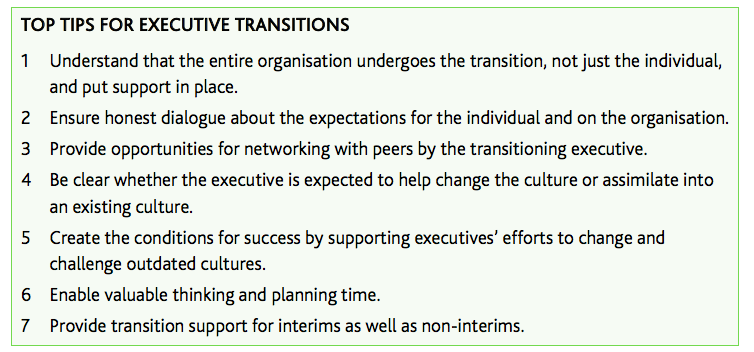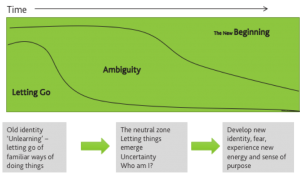Top Tips for Successful Career Transitions
To the backdrop of London’s skyline, MDV Consulting hosted 18 guests to discuss the need, challenges and approaches for successful executive career transitions and onboarding.
A wide ranging discussion saw attendees emphasise the importance of being honest with the transitioning executive about what they are expected to deliver and the need to think systemically, not view transition as a single issue.
Summary
- Transitions are a multi-faceted concern raising many issues around the attraction, assessment and onboarding of talent. Agile and flexible approaches are required to address these specific contexts. For transitions to work, clarification is needed about why the individual is being brought in – does the culture need to change or does the new executive need to assimilate? If the culture needs to change, what steps can be taken to make sure the conditions for the executive’s success are optimised?
- Transitions impact more widely than just the individual and as part of transition planning, it is critical to think about the overall impact on the team and the wider organisation.
- Many approaches were taken to supporting onboarding and transitions; some provided one-to-one transition coaching; others working to develop new ways of communicating bite-sized, easy-to-digest development information. Some favoured group or programmatic interventions, whilst others provided a very individualistic approach dependent on individual needs.
- Shorter assignments and the use of interim and staff on short-term contracts is becoming much more widespread, making it imperative to offer transition support for everyone, including interim staff, to get up to speed quickly and effectively.
- There is significant pressure on leaders to immediately start delivering in their new role. This pressure is accentuated when the recruitment processes are lengthy and arduous, resulting in crowding out the valuable thinking and planning time the person may need and considerably lengthening time to full productivity.

The size of the problem
Mike Vessey of MDV Consulting spoke about the costs to business of unsuccessful transitions which include:
- Financial costs of losing an employee in the first year of up to 14 times annual salary.
- 50% of executives fail (quit or are fired) within the first three years of a transition.
- $37 billion is lost each year as a result of employees misunderstanding their jobs.
- Given we spend £10bn pa on executive sourcing and £3bn on talent measurement, transition support was crucial to realise a return on the time and costs invested in executive hiring.
What a transition programme could look like
 Megan Evans of MDV Consulting outlined an example of a successful transition programme, which included a mix of one-to-one coaching and group-based workshops, to facilitate both individual action planning and group learning and networking. Megan explained that, for example, to foster a strategic approach to the new role, participants are encouraged to start with the end in mind by considering their future legacy. She explained the emotional experience of transitions experienced and that in sharing this model executives can make sense of experiences they may be wrestling with.
Megan Evans of MDV Consulting outlined an example of a successful transition programme, which included a mix of one-to-one coaching and group-based workshops, to facilitate both individual action planning and group learning and networking. Megan explained that, for example, to foster a strategic approach to the new role, participants are encouraged to start with the end in mind by considering their future legacy. She explained the emotional experience of transitions experienced and that in sharing this model executives can make sense of experiences they may be wrestling with.
Benefits of providing transition support
Guest speaker Nicola Robinson, Head of Organisational Development at the Financial Conduct Authority, described the value of executive transition support to her organisation:
- Executives get up to speed quickly with what is expected.
- Sustains leader performance through the period of change.
- Provides opportunities to build support networks by meeting people in other parts of the business.
- Helps retention as participants better understand how to navigate the culture.
- Improves engagement.
- Provides reflective space for executives to focus on what is really important and how they can go about getting things done.
Nicola reflected on her own transition experiences, highlighting:
- It was important to realise her team were also going through a transition as well.
- It was helpful to consider her 100 day plan and to have practical guidance for doing so.
- She found the following texts useful when planning her transition – ‘The First 90 Days’ by Michael Watkins, ‘Your First 100 Days: How to Make Maximum Impact in Your New Leadership Role’ by Niamh O’Keeffe and ‘Lead Your Team in Your First 100 Days’ by Niamh O’Keeffe.
“Although it felt strange writing my leaving party speech when I’d just joined, it really helped me articulate a vision for OD and reminded me why I had joined and what difference I wanted to make.”
In the roundtable discussion which followed, the group explored a number of facets to the issue of successful transition:
Transition support for technical specialists
Technical specialists moving into leadership roles had particular transition needs. Duncan Symonds, Head of Infrastructure at WSP, highlighted that technical specialists as managers of Millennials need a flexible leadership style which may not come easily in the first instance.
Beth Taylor, Partner for Talent and Succession at PwC, suggested that more thought should be given to who is appointed to manage staff when technical specialists may not have an appetite for this. The group discussed the merits of alternative career paths for technical specialists, alongside the appointment of non-specialist leaders, who get excited about managing people. Carl Du Plessis, Head of Resourcing & Talent at The Co-operative Bank, said that it was important to look at the specific role when hiring and make a judgement about what skill set might best fulfil it.
Vanda Forward, General Insurance L&D Partner at LV, said that in areas where there is a heavy reliance on technical leaders, the use of employee satisfaction surveys was a powerful metric to assess leadership performance – their senior leaders believe the survey is a critical business measure as motivated and engaged people deliver the best results. Nicola Robinson agreed it takes time to change an organisation’s culture but this can be assisted by reviewing what gets measured – measuring customer and staff engagement and aligning reward, recognition and performance management structures with these measures helps to clarify what is valued in an organisation.
The shrinking length of assignments
Diana Hogbin-Mills, Talent and Executive Development Manager of Network Rail, explained that for delivering specific projects and shorter-term assignments, roles lasting on an 18 month basis may be required. These needed different and transparent dialogue with staff, as part of transitioning them on and off the projects.
Lynne Chambers, Group Head of Talent at the London Stock Exchange Group, commented that she had noticed a shift to more interim hires. Short-term contract working is becoming more and more common and transition support was as important for interims as for all other staff.
James Edgar, HR Director of CDC Group, commented that a strategic approach to the use of short-term contracts could benefit organisations by supporting the development of internal resource, to prepare them for future succession through knowledge transfer. This would impact the balance of external hires and internal promotions and output measures will need to vary depending on those choices.
Improving selection
Vicky Voller, Head of Education and Learning for NCAS, suggested that high transition failure statistics indicated a need for better selection processes to detect those who will be most engaged with an organisation. Beth Taylor said she was concerned that the ‘barriers’ of a long and gruelling selection process can actually accelerate the pressure on the individual to succeed as soon as they join. Lengthy recruitment processes, particularly for regulated ‘approved persons’, can also indicate that an organisation has not provided clear expectations on what the executive needs to achieve in the role. Carl Du Plessis commented that generally much of the selection process was focused on the individual showing what they can do and not necessarily the organisation saying what they really want from the individual.
Honest dialogue
Honest dialogue was required from both the organisation and the individual about their expectations. Kelly Shortland said that one way of ensuring those honest conversations took place was by giving recruits the opportunity to meet existing leaders to get a candid view of an organisation.
Managing selection with development
Stuart Macintyre, Head of Executive Talent at RBS, commented that RBS had successfully combined its executive search team with its internal talent development team, to ensure better integration between the external recruitment process, internal talent deployment and the transition and development support needed by the individual post assessment and appointment.
Cultural cultivators
What is the expectation on the new executive in cultivating cultural change? Lynne Chambers said that many transitions fail because of the tension created between the incoming individual who wants to change the culture and an organisation which is not ready for that change. Other transition difficulties occur when an executive joins thinking the culture is static, when this is not the case and the organisation is undergoing cultural transition itself. The significance of informing an incoming leader that they are expected to help with cultural change was emphasised by Kelly Shortland, who highlighted being clear with leaders that “they are the culture”, if cultural change is to happen, the leadership has to take accountability for driving the change.
“What culture does the person joining pin themselves to – particularly if the person is transitioning whilst the company culture is also transitioning?”
Alison Clunas, Leadership Development Technical Specialist for the Financial Conduct Authority, said they were focusing on embedding cultural change amongst their next generation of leaders. Using small cohort groups, they are helping leaders think about how to articulate with other people about the cultural changes required.
With thanks to our roundtable contributors:
Alison Clunas, Leadership Development Technical Specialist, Financial Conduct Authority
Beth Taylor, Partner for Talent & Succession, PwC
Carl Du Plessis, Head of Resourcing & Talent, The Co-operative Bank
Caroline Darker, Head of Management Development & Communications, Brit Insurance
Diana Hogbin-Mills, Talent & Executive Development Manager, Network Rail
Duncan Symonds, Head of Infrastructure, WSP
James Edgar, HR Director, CDC Group
Kelly Shortland, Director, Executive Development, Barclays Bank Plc
Lynne Chambers, Group Head of Talent, London Stock Exchange Group
Nicola Robinson, Head of Department, HR Organisational Development, Financial Conduct Authority
Dr Sari Kaipianen, Network Rail
Stuart Macintyre, Head of Executive Talent, RBS
Vicky Voller, Head of Education & Learning, NCAS
Vanda Forward, General Insurance L&D Partner, LV
For more information please contact: Megan Evans

